Johnson R.S. A Modern Introduction to the Mathematical Theory of Water Waves
Подождите немного. Документ загружается.

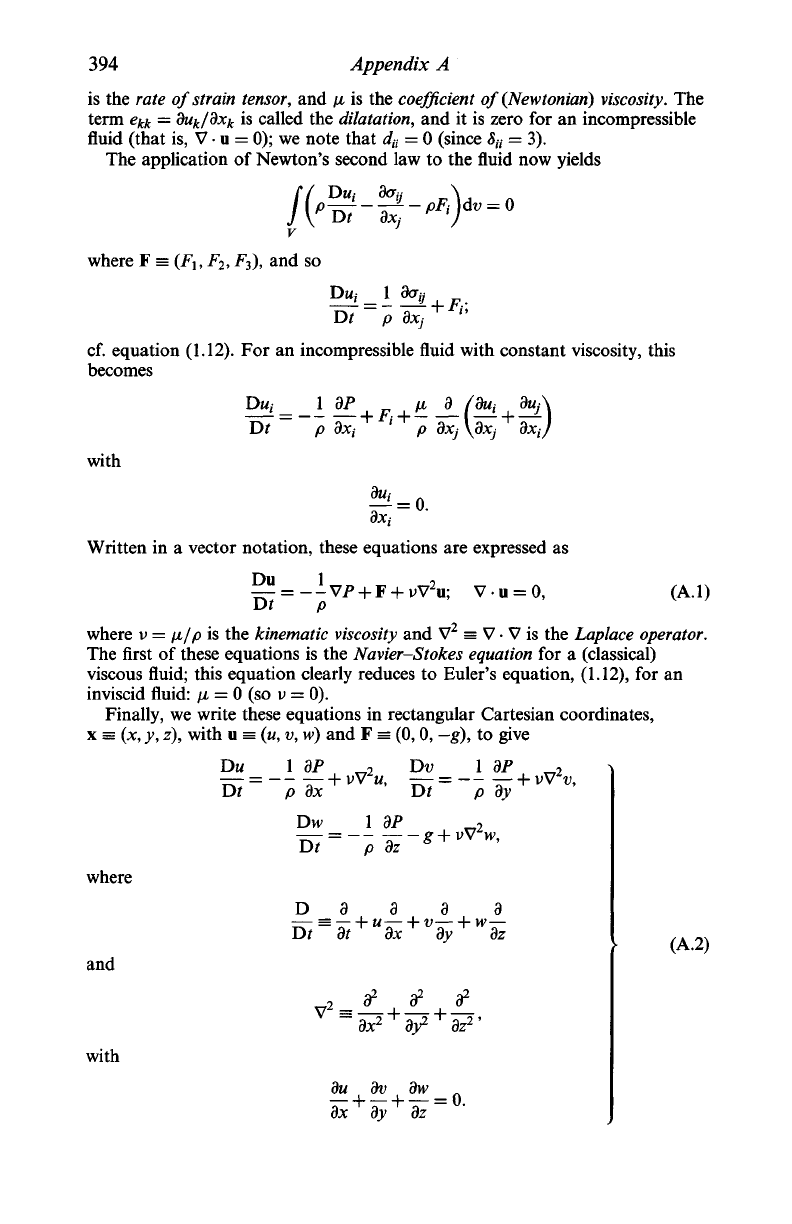
394
Appendix A
is the rate of strain tensor, and
11
is the coefficient of
{Newtonian)
viscosity. The
term e^ = du
k
/dx
k
is called the
dilatation,
and it is zero for an incompressible
fluid (that is, V u = 0); we note that d
u
= 0 (since S
ti
= 3).
The application of Newton's second law to the fluid now yields
where F =
(F
l
,F
2
,
F
3
),
and so
Dt p
cf. equation (1.12). For an incompressible fluid with constant viscosity, this
becomes
Dt/;
Dt
with
t p dxi ^ p dXj\3x/dxJ
dx
t
Written in a vector notation, these equations are expressed as
—^
= --VP + F + vV
2
u; Vu = 0,
Dt p
(A.1)
where v
—
ii/p is the kinematic viscosity and V
2
= V
•
V is the Laplace operator.
The first of these equations is the Navier-Stokes
equation
for a (classical)
viscous fluid; this equation clearly reduces to Euler's equation, (1.12), for an
inviscid fluid: fi = 0 (so v = 0).
Finally, we write these equations in rectangular Cartesian coordinates,
x =
(x,
y, z), with u =
(w,
v,
w)
and F = (0, 0, —
g),
to give
Du
Dt~
l dP
p dx
Dw
2
1
P
dP
~dz
Dv
Dt~
-g +
1
P
2
vV
dP
dy
w,
where
and
with
D
2
a
2
~3
2
a
2
a
2
i
du dv dw
(A.2)
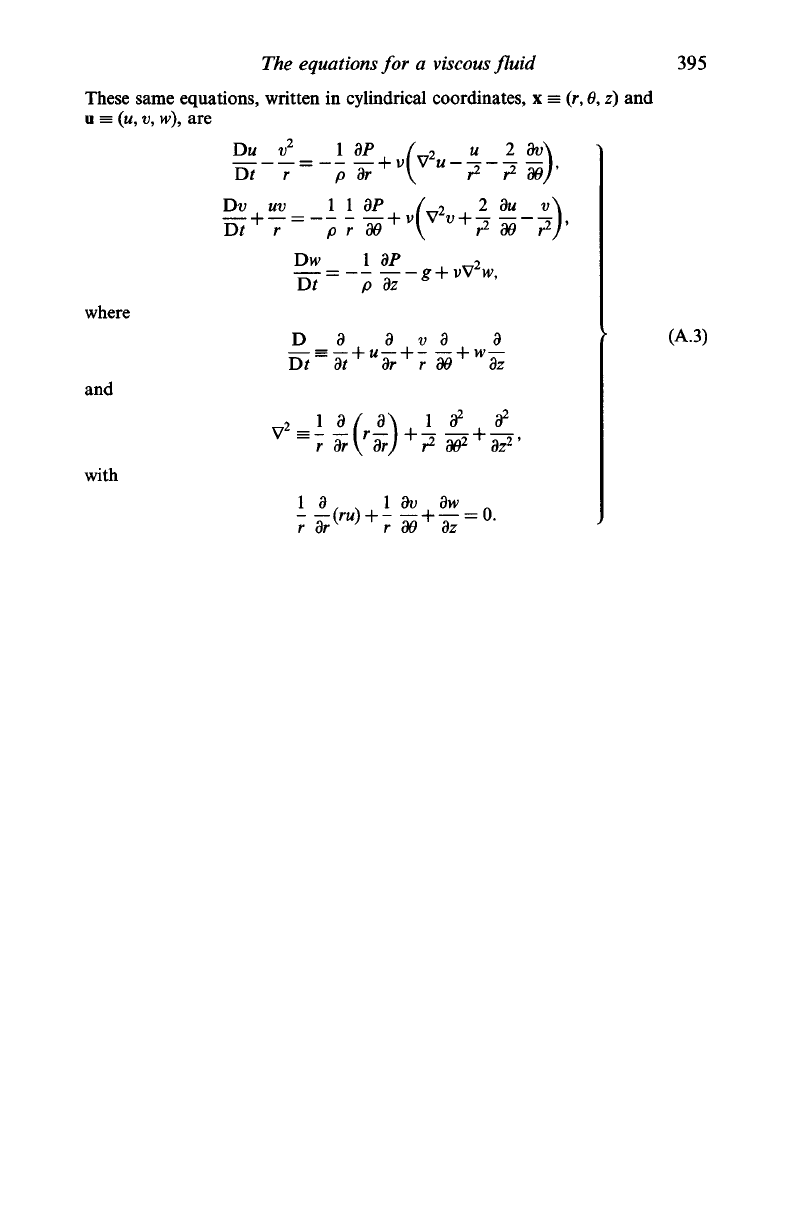
The equations for a
viscous
fluid
These same equations, written in cylindrical coordinates, x = (r,
0,
z) and
u =
(M,
v,
w),
are
Du v
2
1 dP (
2
u 2 &v
395
where
and
with
Dv uv _ 1 1 9? / 2 2 du v
Dw 1 8P ^
2
= g
+ vV
w,
Dt p dz *
D 8 3 v 8
=
r dr\
r
dr)
+
r
2
dO
1
*
dz
2
(A.3)

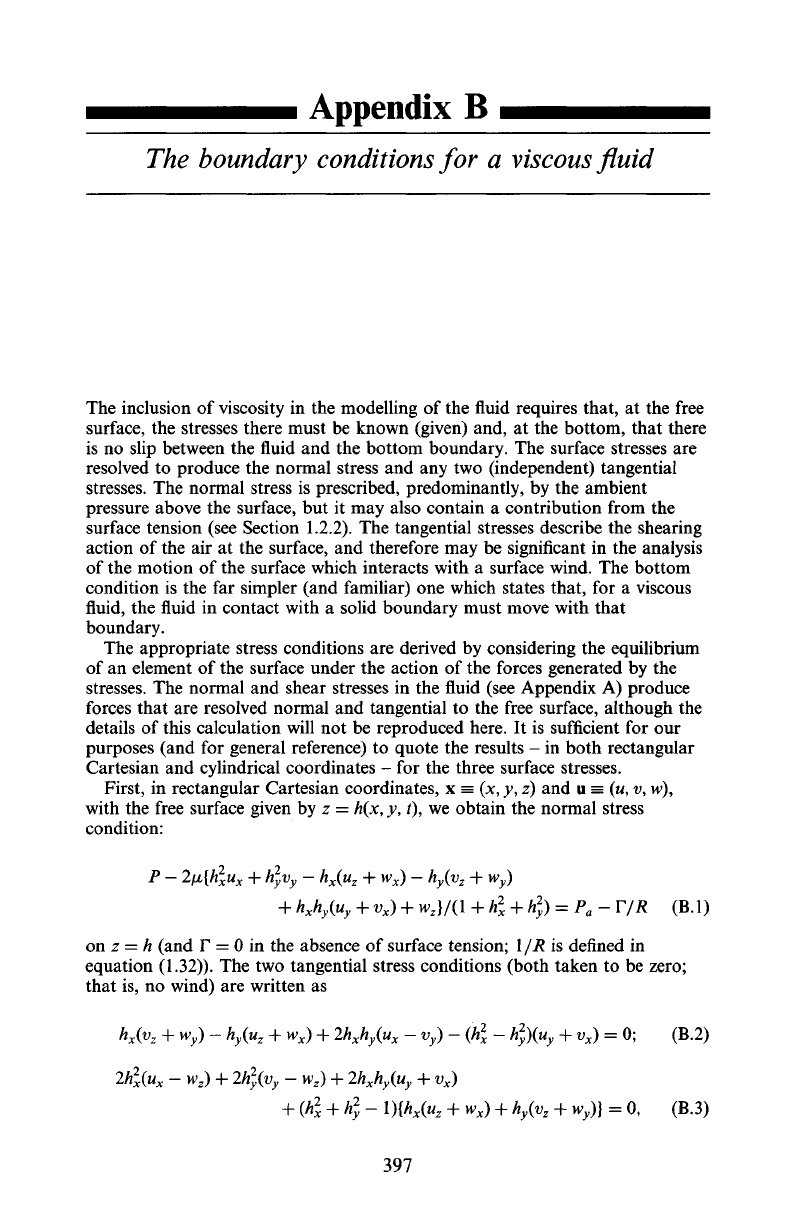
Appendix B
The boundary conditions for a viscous fluid
The inclusion of viscosity in the modelling of the fluid requires that, at the free
surface, the stresses there must be known (given) and, at the bottom, that there
is no slip between the fluid and the bottom boundary. The surface stresses are
resolved to produce the normal stress and any two (independent) tangential
stresses. The normal stress is prescribed, predominantly, by the ambient
pressure above the surface, but it may also contain a contribution from the
surface tension (see Section
1.2.2).
The tangential stresses describe the shearing
action of the air at the surface, and therefore may be significant in the analysis
of the motion of the surface which interacts with a surface wind. The bottom
condition is the far simpler (and familiar) one which states that, for a viscous
fluid, the fluid in contact with a solid boundary must move with that
boundary.
The appropriate stress conditions are derived by considering the equilibrium
of an element of the surface under the action of the forces generated by the
stresses. The normal and shear stresses in the fluid (see Appendix A) produce
forces that are resolved normal and tangential to the free surface, although the
details of this calculation will not be reproduced here. It is sufficient for our
purposes (and for general reference) to quote the results - in both rectangular
Cartesian and cylindrical coordinates - for the three surface stresses.
First, in rectangular Cartesian coordinates, x = (x, y, z) and u =
(w,
v, w),
with the free surface given by z =
h(x,
y, t), we obtain the normal stress
condition:
P
—
2\x{h
x
u
x
+
hyVy —
h
x
(u
z
+ w
x
)
—
h
y
(v
z
+ w
y
)
+
h
x
hy(u
y
+ v
x
) +
w
z
}/(\
+
h
2
x
+ ^) = P
a
- r/i* (B.I)
onz = /i (and T = 0 in the absence of surface tension; \/R is defined in
equation (1.32)). The two tangential stress conditions (both taken to be zero;
that is, no wind) are written as
h
x
(v
z
+ w
y
)
—
h
y
(u
z
+ w
x
) + 2h
x
h
y
(u
x
—
v
y
)
—
{h
2
x
—
h
2
)(u
y
+ v
x
) = 0; (B.2)
2h
2
x
(u
x
- w
z
) +
2h
2
y(v
y
- w
z
) + 2h
x
hy(u
y
+ v
x
)
"
hh
2
y
-
\){h
x
(u
z
+ w
x
) + ^fe + w
y
)} = 0, (B.3)
397
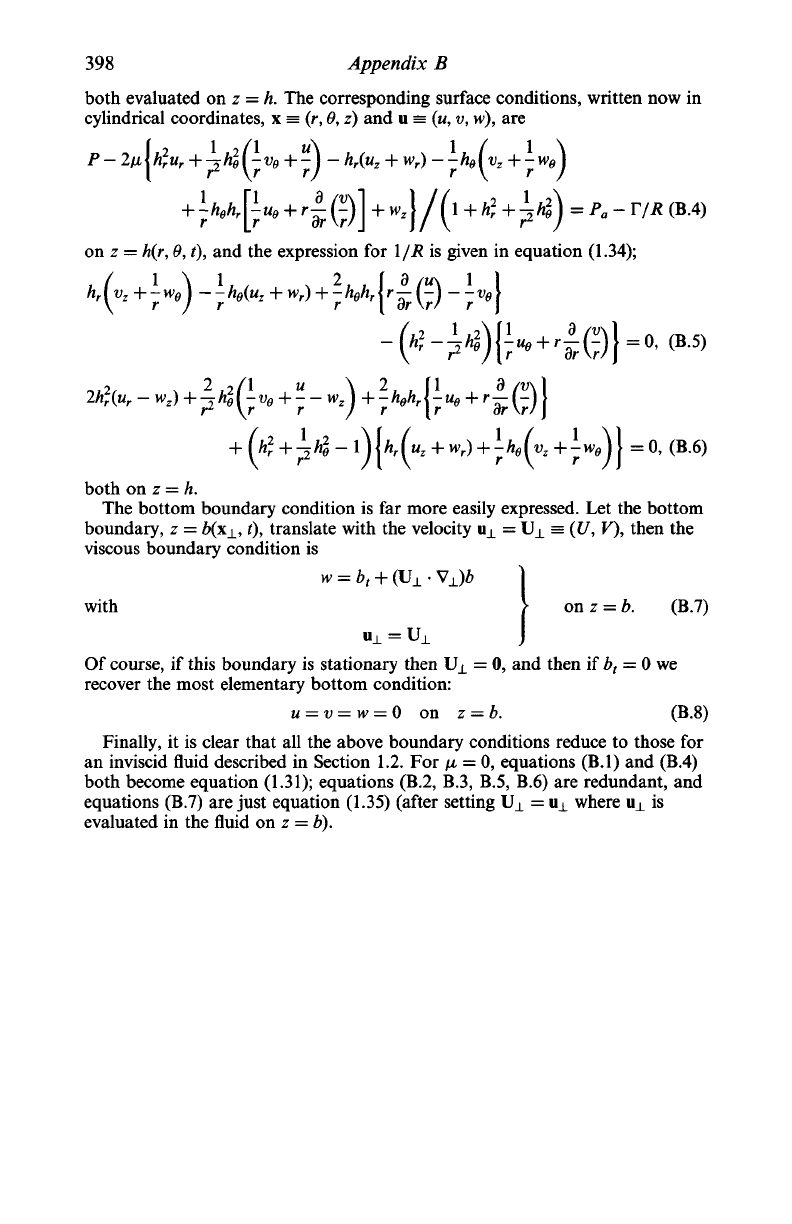
398 Appendix B
both evaluated on z = h. The corresponding surface conditions, written now in
cylindrical coordinates, x =
(r, 0,
z) and u =
(w,
v,
w),
are
P-
2/j^
r
^j^e
f)
r
(
z
r
)
9
(
z
^
e
j
+
i^^
r
^^-hr^g)J
+^}^(^1
-h^+.L/,^
=
^_r//?
(B.4)
on z =
h(r, 0,
t), and the expression for \/R is given in equation (1.34);
r)
+
X
-h
e
(v
2
+
l
-
= 0, (B.6)
both on z =
/L
The bottom boundary condition is far more easily expressed. Let the bottom
boundary, z = 6(x
±
, t), translate with the velocity u
±
= \J
±
= (U, V), then the
viscous boundary condition is
with > onz = 6. (B.7)
u
±
=U
±
J
Of course, if this boundary is stationary then U
±
= 0, and then if b
t
= 0 we
recover the most elementary bottom condition:
W
=
U
=
H>
= 0 on z =
b.
(B.8)
Finally, it is clear that all the above boundary conditions reduce to those for
an inviscid fluid described in Section 1.2. For \i
—
0, equations (B.I) and (B.4)
both become equation (1.31); equations (B.2, B.3, B.5, B.6) are redundant, and
equations (B.7) are just equation (1.35) (after setting
UJL
= u
±
where u
±
is
evaluated in the fluid on z = b).
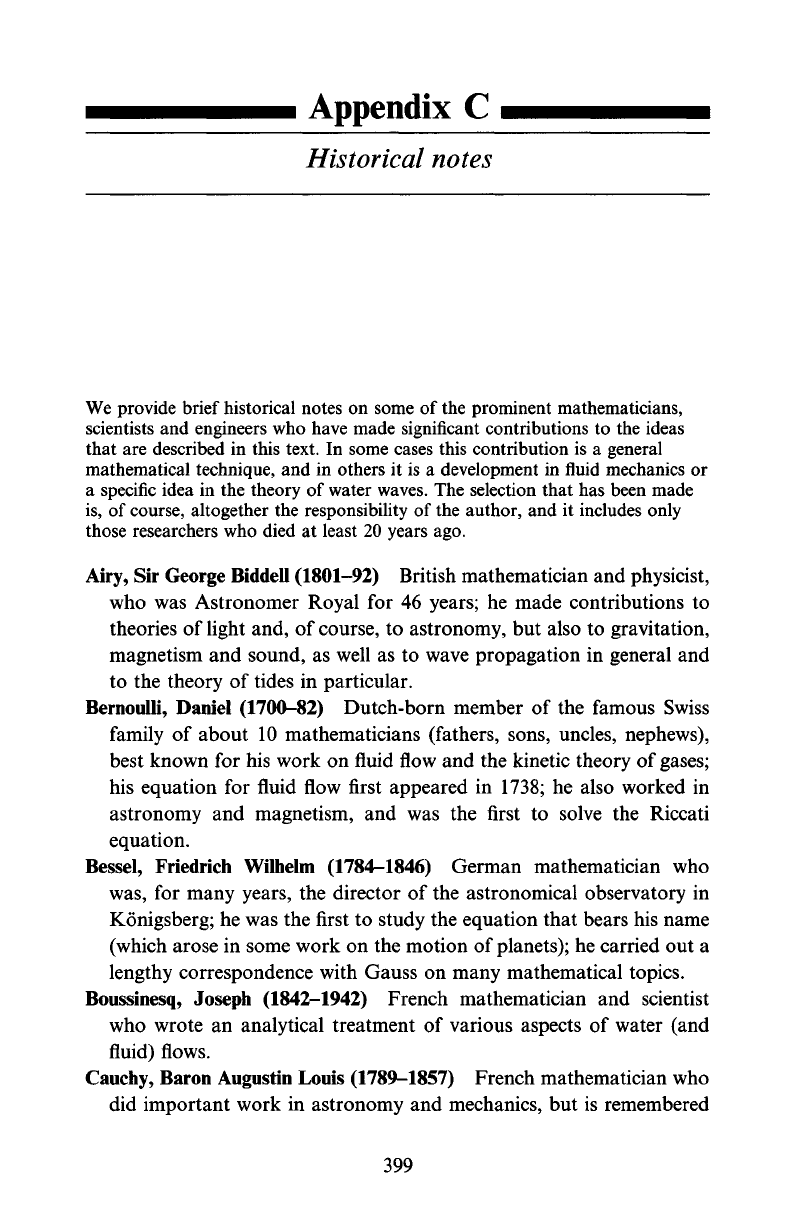
Appendix C
Historical notes
We provide brief historical notes on some of the prominent mathematicians,
scientists and engineers who have made significant contributions to the ideas
that are described in this text. In some cases this contribution is a general
mathematical technique, and in others it is a development in fluid mechanics or
a specific idea in the theory of water waves. The selection that has been made
is,
of course, altogether the responsibility of the author, and it includes only
those researchers who died at least 20 years ago.
Airy, Sir George Biddell (1801-92) British mathematician and physicist,
who was Astronomer Royal for 46 years; he made contributions to
theories of light and, of
course,
to astronomy, but also to gravitation,
magnetism and sound, as well as to wave propagation in general and
to the theory of tides in particular.
Bernoulli, Daniel (1700-82) Dutch-born member of the famous Swiss
family of about 10 mathematicians (fathers, sons, uncles, nephews),
best known for his work on fluid flow and the kinetic theory of gases;
his equation for fluid flow first appeared in 1738; he also worked in
astronomy and magnetism, and was the first to solve the Riccati
equation.
Bessel, Friedrich Wilhelm (1784-1846) German mathematician who
was,
for many years, the director of the astronomical observatory in
Konigsberg; he was the first to study the equation that bears his name
(which arose in some work on the motion of
planets);
he carried out a
lengthy correspondence with Gauss on many mathematical topics.
Boussinesq, Joseph (1842-1942) French mathematician and scientist
who wrote an analytical treatment of various aspects of water (and
fluid) flows.
Cauchy, Baron Augustin Louis (1789-1857) French mathematician who
did important work in astronomy and mechanics, but is remembered
399
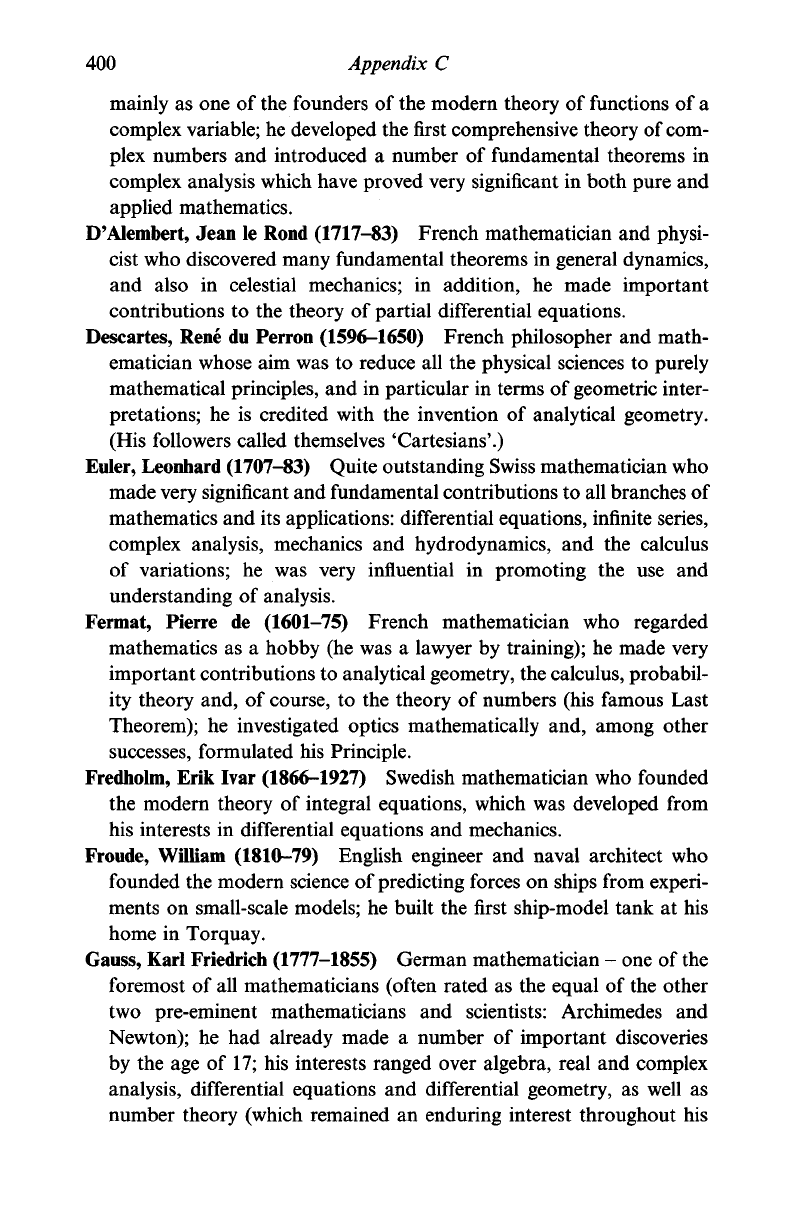
400 Appendix C
mainly as one of the founders of the modern theory of functions of a
complex variable; he developed the first comprehensive theory of com-
plex numbers and introduced a number of fundamental theorems in
complex analysis which have proved very significant in both pure and
applied mathematics.
D'Alembert, Jean le Rond (1717-83) French mathematician and physi-
cist who discovered many fundamental theorems in general dynamics,
and also in celestial mechanics; in addition, he made important
contributions to the theory of partial differential equations.
Descartes, Rene du Perron (1596-1650) French philosopher and math-
ematician whose aim was to reduce all the physical sciences to purely
mathematical principles, and in particular in terms of geometric inter-
pretations; he is credited with the invention of analytical geometry.
(His followers called themselves 'Cartesians'.)
Euler, Leonhard (1707-83) Quite outstanding Swiss mathematician who
made very significant and fundamental contributions to all branches of
mathematics and its applications: differential equations, infinite series,
complex analysis, mechanics and hydrodynamics, and the calculus
of variations; he was very influential in promoting the use and
understanding of analysis.
Fermat, Pierre de (1601-75) French mathematician who regarded
mathematics as a hobby (he was a lawyer by training); he made very
important contributions to analytical geometry, the calculus, probabil-
ity theory and, of course, to the theory of numbers (his famous Last
Theorem); he investigated optics mathematically and, among other
successes, formulated his Principle.
Fredholm, Erik Ivar (1866-1927) Swedish mathematician who founded
the modern theory of integral equations, which was developed from
his interests in differential equations and mechanics.
Froude, William (1810-79) English engineer and naval architect who
founded the modern science of predicting forces on ships from experi-
ments on small-scale models; he built the first ship-model tank at his
home in Torquay.
Gauss, Karl Friedrich (1777-1855) German mathematician - one of the
foremost of all mathematicians (often rated as the equal of the other
two pre-eminent mathematicians and scientists: Archimedes and
Newton); he had already made a number of important discoveries
by the age of 17; his interests ranged over algebra, real and complex
analysis, differential equations and differential geometry, as well as
number theory (which remained an enduring interest throughout his
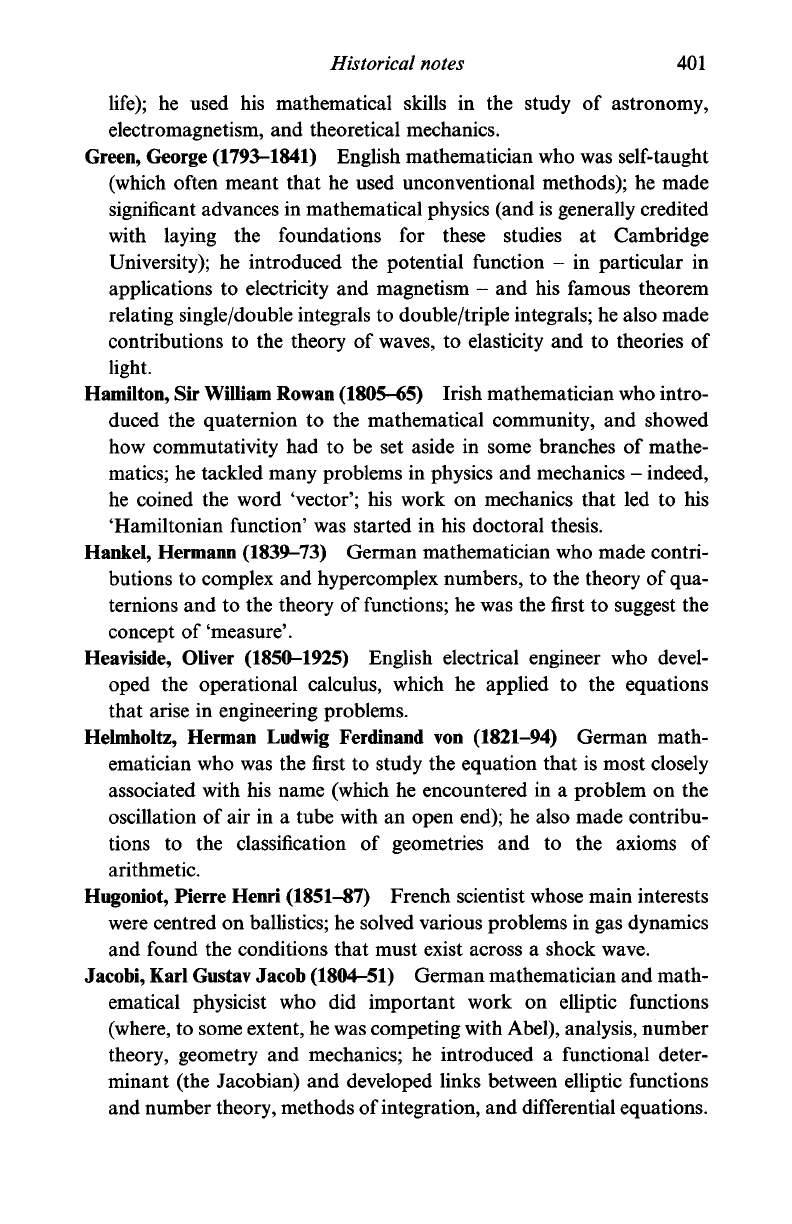
Historical notes
401
life);
he used his mathematical skills in the study of astronomy,
electromagnetism, and theoretical mechanics.
Green, George (1793-1841) English mathematician who was self-taught
(which often meant that he used unconventional methods); he made
significant advances in mathematical physics (and is generally credited
with laying the foundations for these studies at Cambridge
University); he introduced the potential function - in particular in
applications to electricity and magnetism - and his famous theorem
relating single/double integrals to double/triple integrals; he also made
contributions to the theory of waves, to elasticity and to theories of
light.
Hamilton, Sir William Rowan (1805-65) Irish mathematician who intro-
duced the quaternion to the mathematical community, and showed
how commutativity had to be set aside in some branches of mathe-
matics; he tackled many problems in physics and mechanics - indeed,
he coined the word 'vector'; his work on mechanics that led to his
'Hamiltonian function' was started in his doctoral thesis.
Hankel, Hermann (1839-73) German mathematician who made contri-
butions to complex and hypercomplex numbers, to the theory of qua-
ternions and to the theory of functions; he was the first to suggest the
concept of 'measure'.
Heaviside, Oliver (1850-1925) English electrical engineer who devel-
oped the operational calculus, which he applied to the equations
that arise in engineering problems.
Helmholtz, Herman Ludwig Ferdinand von (1821-94) German math-
ematician who was the first to study the equation that is most closely
associated with his name (which he encountered in a problem on the
oscillation of air in a tube with an open end); he also made contribu-
tions to the classification of geometries and to the axioms of
arithmetic.
Hugoniot, Pierre Henri (1851-87) French scientist whose main interests
were centred on ballistics; he solved various problems in gas dynamics
and found the conditions that must exist across a shock wave.
Jacobi, Karl Gustav Jacob (1804-51) German mathematician and math-
ematical physicist who did important work on elliptic functions
(where, to some extent, he was competing with
Abel),
analysis, number
theory, geometry and mechanics; he introduced a functional deter-
minant (the Jacobian) and developed links between elliptic functions
and number theory, methods of integration, and differential equations.
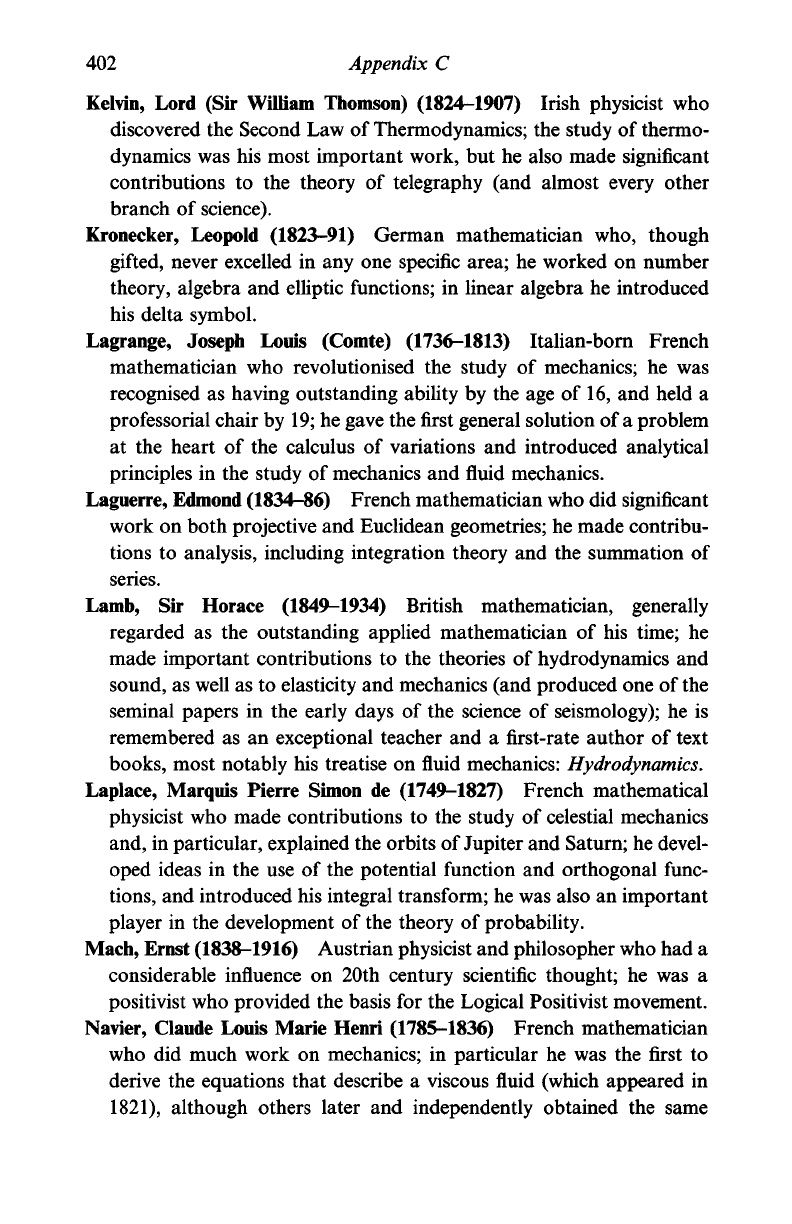
402 Appendix C
Kelvin, Lord (Sir William Thomson) (1824-1907) Irish physicist who
discovered the Second Law of Thermodynamics; the study of thermo-
dynamics was his most important work, but he also made significant
contributions to the theory of telegraphy (and almost every other
branch of science).
Kronecker, Leopold (1823-91) German mathematician who, though
gifted, never excelled in any one specific area; he worked on number
theory, algebra and elliptic functions; in linear algebra he introduced
his delta symbol.
Lagrange, Joseph Louis (Comte) (1736-1813) Italian-born French
mathematician who revolutionised the study of mechanics; he was
recognised as having outstanding ability by the age of 16, and held a
professorial chair by
19;
he gave the first general solution of
a
problem
at the heart of the calculus of variations and introduced analytical
principles in the study of mechanics and fluid mechanics.
Laguerre, Edmond (1834-86) French mathematician who did significant
work on both projective and Euclidean geometries; he made contribu-
tions to analysis, including integration theory and the summation of
series.
Lamb,
Sir Horace (1849-1934) British mathematician, generally
regarded as the outstanding applied mathematician of his time; he
made important contributions to the theories of hydrodynamics and
sound, as well as to elasticity and mechanics (and produced one of the
seminal papers in the early days of the science of seismology); he is
remembered as an exceptional teacher and a first-rate author of text
books, most notably his treatise on fluid mechanics:
Hydrodynamics.
Laplace, Marquis Pierre Simon de (1749-1827) French mathematical
physicist who made contributions to the study of celestial mechanics
and, in particular, explained the orbits of Jupiter and Saturn; he devel-
oped ideas in the use of the potential function and orthogonal func-
tions,
and introduced his integral transform; he was also an important
player in the development of the theory of probability.
Mach, Ernst (1838-1916) Austrian physicist and philosopher who had a
considerable influence on 20th century scientific thought; he was a
positivist who provided the basis for the Logical Positivist movement.
Navier, Claude Louis Marie Henri (1785-1836) French mathematician
who did much work on mechanics; in particular he was the first to
derive the equations that describe a viscous fluid (which appeared in
1821),
although others later and independently obtained the same
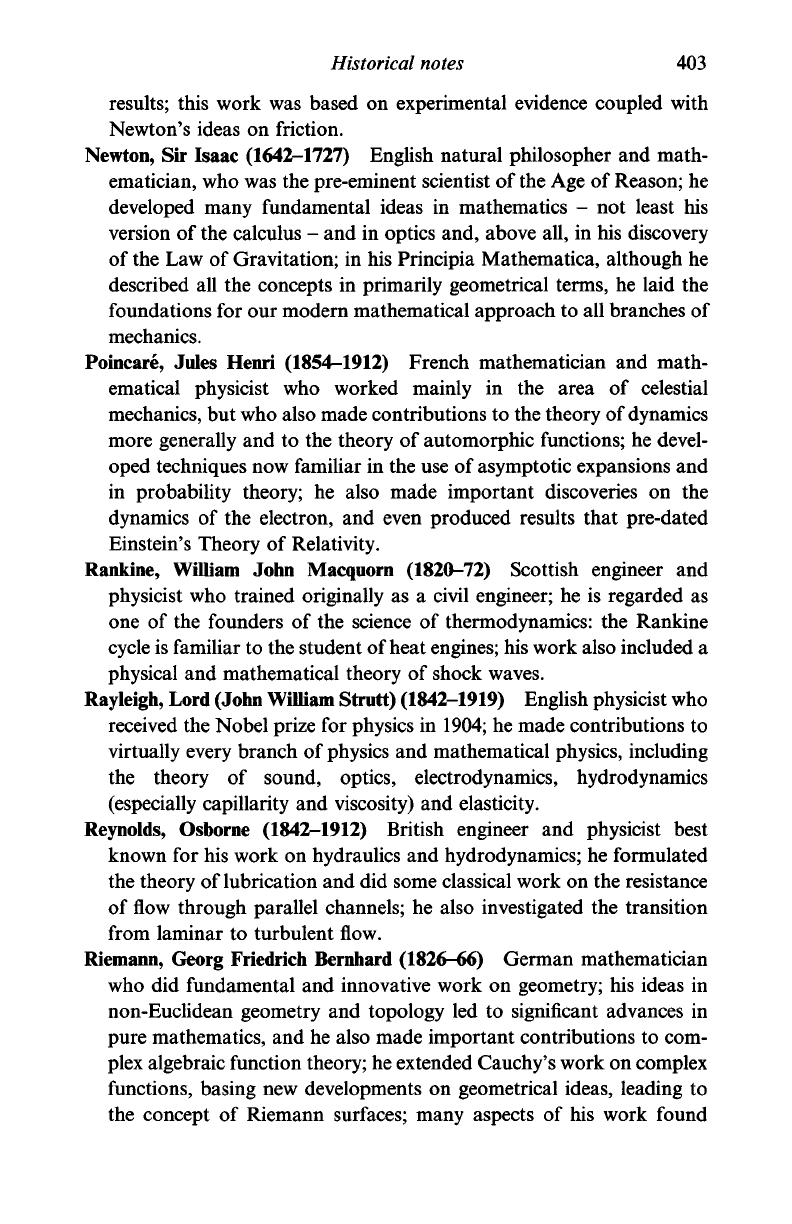
Historical notes
403
results; this work was based on experimental evidence coupled with
Newton's ideas on friction.
Newton, Sir Isaac (1642-1727) English natural philosopher and math-
ematician, who was the pre-eminent scientist of
the
Age of Reason; he
developed many fundamental ideas in mathematics - not least his
version of the calculus - and in optics and, above all, in his discovery
of the Law of Gravitation; in his Principia Mathematica, although he
described all the concepts in primarily geometrical terms, he laid the
foundations for our modern mathematical approach to all branches of
mechanics.
Poincare, Jules Henri (1854-1912) French mathematician and math-
ematical physicist who worked mainly in the area of celestial
mechanics, but who also made contributions to the theory of dynamics
more generally and to the theory of automorphic functions; he devel-
oped techniques now familiar in the use of asymptotic expansions and
in probability theory; he also made important discoveries on the
dynamics of the electron, and even produced results that pre-dated
Einstein's Theory of Relativity.
Rankine, William John Macquorn (1820-72) Scottish engineer and
physicist who trained originally as a civil engineer; he is regarded as
one of the founders of the science of thermodynamics: the Rankine
cycle is familiar to the student of heat
engines;
his work also included a
physical and mathematical theory of shock waves.
Rayleigh, Lord (John William Strutt) (1842-1919) English physicist who
received the Nobel prize for physics in 1904; he made contributions to
virtually every branch of physics and mathematical physics, including
the theory of sound, optics, electrodynamics, hydrodynamics
(especially capillarity and viscosity) and elasticity.
Reynolds, Osborne (1842-1912) British engineer and physicist best
known for his work on hydraulics and hydrodynamics; he formulated
the theory of lubrication and did some classical work on the resistance
of flow through parallel channels; he also investigated the transition
from laminar to turbulent flow.
Riemann, Georg Friedrich Bernhard (1826-66) German mathematician
who did fundamental and innovative work on geometry; his ideas in
non-Euclidean geometry and topology led to significant advances in
pure mathematics, and he also made important contributions to com-
plex algebraic function theory; he extended Cauchy's work on complex
functions, basing new developments on geometrical ideas, leading to
the concept of Riemann surfaces; many aspects of his work found
